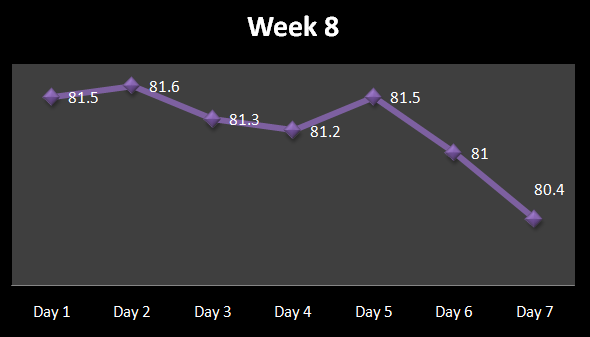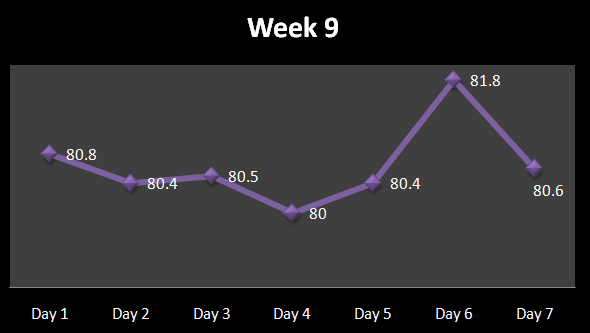The scale - friend or foe
Nikola Man
Parts of this article could perhaps fit into the nutrition section, but the big majority lies within the domain of mental health.
If you want to use the scale as a measurement tool for your progress, then you really only have one way to do it properly. I generally advise using the scale but there are several very important caveats that have to be highlighted before you do so. This post will be particularly useful for ladies because the problems with the scale are more frequent with you.
It’s better to be positive right off the bat so we will start with the good aspects of using the scale. The first thing you need to do is weigh yourself every single day. The second thing you have to ensure is consistency. Consistency in every sense possible: same time of day, same position of the scale on the floor, same clothing or lack thereof (shame on you) and the same amount of food in your stomach. This last point means that you have your dinners the day before at roughly the same time and eat roughly the same quantity of food. It’s easiest to weigh yourself in the morning after your toilet visit so that all factors remain consistent on a daily basis. On top of that, it would be wise to write down your weight, because if you don’t this whole thing loses meaning. All of this sounds complicated and you’re probably thinking that there is no way that the scale is a friend. I don’t blame you, but this is the best way to get an accurate picture of your progress in terms of weight loss. I will try to illustrate this with two graphs of my weight during a cut a while ago:
Imagine that, in week 8, I weighed myself on day 1, 2 and 5. I would be forced into thinking that something’s wrong, I’d probably start panicking and I’d probably either quit or reduce my calories even further, and both options are unbelievably bad. The first issue is that true stagnation can be recognized only if you weigh yourself every day and see no change in 10-15 days. The second issue is that there are many natural fluctuations that can happen due to a million different reasons. If you look at week 9, you can imagine a scenario where I weigh myself on day 1 and day 6. I would have been devastated, but that’s only if you exclude the context of day 5 which was a high calorie, re-feed day with a ton of carbs and sodium which caused water retention and not a kilo of fat gain. I have two pieces of advice for you here: First, calculate the average weight for a week and compare it to the beginning of the week or the last week’s average; secondly, the trend of your weight has to be a downward one. You can visualize a line and if it is going down from day 1 to day 7 of next week, then you’re probably making progress. Obviously, it is not necessary to plot your weight on a chart like a psychopath, visualizing can do you just fine.
Reading the last paragraph probably made you realize that relying on the scale exclusively can be a bit of a problem and there is a chance that you won’t get the right impression of what’s going on. I mentioned fluctuations and water retention, this is especially pronounced with women because your hormones are the most hectic phenomenon in the universe, especially when we take the cycle into account. I’ve seen cases where a graph would look like earthquake readings going up, down, left, right and diagonally and then flat which can be very confusing. It is also worth noting that genetics can cause the weight to stagnate for a month or so for some women, despite the fact that they’ve actually made progress.
The next part of the article will be a series of suggestions on how to stay sane and why the scale isn’t the only tool and how it can even be unnecessary:
You can combine (and really should) the scale with other measurement tools like photos, mirror, measuring tape or your belt
A measuring tape will also give you a numerical representation of weight loss
The mirror is under the influence of subjectivity, but it can be helpful in terms of providing a good snapshot of your physique
Speaking of snapshots, take pictures under the same conditions (same position and lighting) so you can track progress that way because those pictures won’t lie to you
If you’re changing your body composition by going to the gym, you might be gaining muscle and losing fat so your progress won’t even show up on the scale
There are 3 more important things than the scale – the way you look in the mirror (and how satisfied you are with that), your internal feeling of satisfaction and health and your body composition (lean tissue/fat tissue ratio)
The scale can be demoralizing if you see a couple of days of increasing weight
Despite the fact that I told you that you should not panic for at least 10 or 15 days, it can be tough to stay composed if you see “stagnation” for 2 days in a row
If you consume pasta, pizza, rice, potatoes or other carbohydrate-rich food can (and probably will) cause you to retain water which will negatively impact your weight but not your composition
There is a chance you might give up because your diet plan “doesn’t work”
There is an equally likely chance that you will punish yourself by training harder or eating less which is very, very dangerous and counterproductive
Lastly, I think it’s best to use the scale in combination with other tools. In case you are one of those people who will be discouraged by sudden increases or stagnation so much so that the scale causes you stress, then the scale is not for you.

